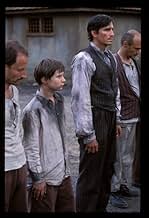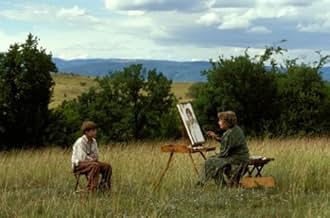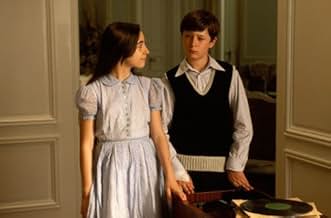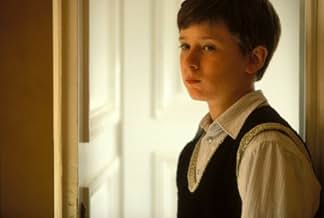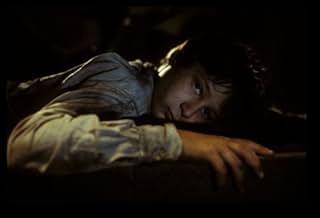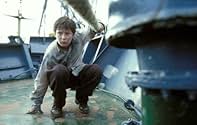IMDb RATING
7.1/10
8.5K
YOUR RATING
A twelve-year-old boy escapes from a Bulgarian Communist concentration camp and sets out on a journey to reach Denmark.A twelve-year-old boy escapes from a Bulgarian Communist concentration camp and sets out on a journey to reach Denmark.A twelve-year-old boy escapes from a Bulgarian Communist concentration camp and sets out on a journey to reach Denmark.
- Awards
- 8 wins & 1 nomination total
Krasimir Kutzoparov
- Camp Officer
- (as Krassimir Kutzuparov)
Diyan Machev
- Party Guest
- (as Deyan Machev)
- Director
- Writers
- All cast & crew
- Production, box office & more at IMDbPro
7.18.5K
1
2
3
4
5
6
7
8
9
10
Featured reviews
A courageous journey...
Pay close attention to young Ben Tibber, who portrays the central character of this film, I Am David. All throughout the film, the mood of the scene is defined just by the expression on his face, especially his eyes, and he can change it in an instant. I watched this young actor in total amazement. We follow David on his solo journey of escape from a brutal communist labor camp to a land very vague in his mind, Denmark. There are many beautiful scenes of colorful villages and towns, fields of sunflowers and sweeping vistas of the hills and valleys that we share with David, in sharp contrast to the horrifying memories of life in the labor camp, that haunts him. Those that helped him escape gave him one primary rule: don't trust anyone! As David travels along the roads to his destiny he meets many characters along the way and we wonder, will he, or should he, trust this person? As the viewer, we desperately want somebody to comfort and assist this wonderful boy. The veteran actress, Joan Plowright, splendidly portrays one of those characters that David encounters; but can he confide in her to help him on his way? The director and screenwriter, Paul Feig, doesn't rush the story, although it does move very quickly at the end. Mostly, he lets us observe David as the boy wisely and carefully analyzes each situation as it develops. The end of the film wraps up nicely with a very surprising and interesting revelation of the storyline. I watched this film at the Heartland Film Festival in Indianapolis and had great expectations upon going in to see it. I was not disappointed. I Am David, is an outstanding film.
Excellent film
In a day when few films are wholesome or uplifting, this film was a breath of fresh air. All those who have made negative remarks about Ben Tibber's performance - it is clear you have never met anyone from Bulgaria. His stoic and serious role was accurate and well done.
As I did not know anything about this movie when I watched it, it seemed slow and at times frustrating. However, I am extremely glad I watched the entire film, as the message of this film is outstanding.
It is unfortunate that many have forgotten that films can be educational as well as entertaining, and uplifting as well as meaningful. Children and adults alike can learn history through films such as I Am David, as they experience stories they may have forever been ignorant of if not for the makers of this film.
As I did not know anything about this movie when I watched it, it seemed slow and at times frustrating. However, I am extremely glad I watched the entire film, as the message of this film is outstanding.
It is unfortunate that many have forgotten that films can be educational as well as entertaining, and uplifting as well as meaningful. Children and adults alike can learn history through films such as I Am David, as they experience stories they may have forever been ignorant of if not for the makers of this film.
10jgbush
David's Story.... A Warm Touch Like Few Others
This movie speaks to the purest parts of the soul, beckoning the viewer to take not just a journey with David, but to the innermost parts of themselves.
If you know someone who is crying out to be heard and understood, someone desperately seeking a safe person to reach out to but doesn't know how to take that first step.....encourage them to go on a journey with this young boy through a harrowing physical and emotional journey of his life.
This movie touched me in a way that very few have. In fact, it moved me so much I had to tell many friends and family members and they too agreed...it is a beautiful story to watch and celebrate. Some have emailed me the day after and said...."We were up late at night with our son...clapping and crying during the final scenes." To the cast and crew of this film....thanks for using your talents to warm our hearts and help us believe again in the good hearts of those around us.
If you know someone who is crying out to be heard and understood, someone desperately seeking a safe person to reach out to but doesn't know how to take that first step.....encourage them to go on a journey with this young boy through a harrowing physical and emotional journey of his life.
This movie touched me in a way that very few have. In fact, it moved me so much I had to tell many friends and family members and they too agreed...it is a beautiful story to watch and celebrate. Some have emailed me the day after and said...."We were up late at night with our son...clapping and crying during the final scenes." To the cast and crew of this film....thanks for using your talents to warm our hearts and help us believe again in the good hearts of those around us.
Two Halves
This is the sort of film that claims merit in allowing you to see a bad situation work out in tear-induced happiness. Its a sort of enigma why there is a market for these; I suppose we all carry unresolved injustices in our hearts and like to see the promise of them resolved. In getting this, we gloss over the mechanics. For instance this has gotten an award from some morality institute though you'd be hard pressed to find anything or character in it that is actually an exemplar.
There's determination, and there's resolution, and somehow we superimpose admiration on the participants.
The really fascinating thing about this is that it really is two films: a long first part, followed by a quite different second part.
The first part follows a boy's escape. There actually is little to say other than this small bit, he escapes, and continues escaping.
The second part finds him with Joan Plowright and takes us to the resolution.
These two parts are from completely different cinematic worlds. It is true that many movies are remembered only for their ending and viewers will forgive all sorts of clunks in the journey if they recall the end fondly. But this first part clunks like old ball bearings in soup. There's one unnecessarily improbable escape after another. Each one adds nothing, except to underscore the difficulty of what our hero is doing. But that difficulty gets undermined at every turn. He never seems hungry, in pain, in the least uncomfortable. He always "gets away." None of the characters or places touch him in any way.
It seems as if the writer is putting us through this long process for only one reason, so that we can get a large number of flashbacks, each one revealing a little more of what becomes the real story. I'm prepared for indirect narrative; its an amazingly effective tool that I study. Here, we sort out the sense of the thing as he does.
But the container of this first part is so sickly sweet almost every viewer will give up, unless you live in a world of Sunday School cartoons.
The second part is as competent as the first is incompetent. Here, we harvest all the information we have been given in the flashbacks. Plus we have a real actor involved instead of folks who believe beatified shining is acting.
Here;s where we get three twists in the narrative, one large. And there's the hint that our boy is an illicit child, and the complications that brings. Its almost enough to make this watchable. But that first part puts us in a prison we cannot escape.
Ted's Evaluation -- 2 of 3: Has some interesting elements.
There's determination, and there's resolution, and somehow we superimpose admiration on the participants.
The really fascinating thing about this is that it really is two films: a long first part, followed by a quite different second part.
The first part follows a boy's escape. There actually is little to say other than this small bit, he escapes, and continues escaping.
The second part finds him with Joan Plowright and takes us to the resolution.
These two parts are from completely different cinematic worlds. It is true that many movies are remembered only for their ending and viewers will forgive all sorts of clunks in the journey if they recall the end fondly. But this first part clunks like old ball bearings in soup. There's one unnecessarily improbable escape after another. Each one adds nothing, except to underscore the difficulty of what our hero is doing. But that difficulty gets undermined at every turn. He never seems hungry, in pain, in the least uncomfortable. He always "gets away." None of the characters or places touch him in any way.
It seems as if the writer is putting us through this long process for only one reason, so that we can get a large number of flashbacks, each one revealing a little more of what becomes the real story. I'm prepared for indirect narrative; its an amazingly effective tool that I study. Here, we sort out the sense of the thing as he does.
But the container of this first part is so sickly sweet almost every viewer will give up, unless you live in a world of Sunday School cartoons.
The second part is as competent as the first is incompetent. Here, we harvest all the information we have been given in the flashbacks. Plus we have a real actor involved instead of folks who believe beatified shining is acting.
Here;s where we get three twists in the narrative, one large. And there's the hint that our boy is an illicit child, and the complications that brings. Its almost enough to make this watchable. But that first part puts us in a prison we cannot escape.
Ted's Evaluation -- 2 of 3: Has some interesting elements.
Brilliant!
Loved the Movie! One of the most faithful renditions of a book to screen....gripping adventure....wonderful scenery, great characters, heartfelt acting, both funny and sad at the same time. Beautiful Photography, many of the scenes would be great standalone still photos. Felt like I went on vacation in Europe watching this picture. About time we have a movie without gratuitous sex and violence, and a break from reality programming, that has come to the point of offering live, real-time war as an option. Am surprised that many of the professional reviews seem to have been written by people with no background for this type of movie, and just don't get it. Waiting to see more from this director, Paul Feig.
Did you know
- TriviaStewart Copeland, drummer for rock band The Police, composed the soundtrack for this movie. For inspiration, he immersed himself in Eastern European Gypsy and folk music.
- GoofsWhen Maria shows David a globe, David asks her to show him Denmark. The camera focuses on Denmark, then traces down the globe to Italy. Though antique in appearance, modern country names on the globe (Czech Republic, Slovakia, Bosnia) show it dates at least from 1993.
- ConnectionsReferenced in The Benchwarmers (2006)
- SoundtracksRuphinka is Taken Ill
Written by Kosta Kolev
Performed by Vesselin Djigov
Courtesy of Bulgarian National Radio
- How long is I Am David?Powered by Alexa
Details
Box office
- Gross US & Canada
- $288,552
- Opening weekend US & Canada
- $160,346
- Dec 5, 2004
- Gross worldwide
- $329,577
- Runtime
- 1h 30m(90 min)
- Color
- Sound mix
- Aspect ratio
- 1.85 : 1
Contribute to this page
Suggest an edit or add missing content



